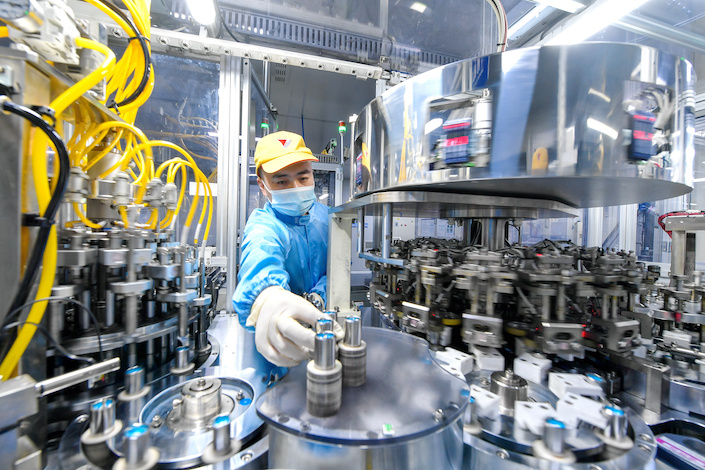BYD to Raise Battery Price 20% as Lithium Costs Soar

Chinese electric-car and battery maker BYD (002594.SZ) will increase the price of battery products by at least 20% effective Nov. 1, the company said Monday in a letter to clients.
The move is further evidence that producer cost inflation is appearing in consumer products. The costs of raw materials to produce lithium batteries has soared this year as a result of surging demand for electric vehicles and power-supply limits.
Lithium cobalt oxide for cathode materials more than tripled in price since December, and the price of electrolyte rose by more than 150%, leading to a significant increase in BYD’s costs, the company said. The higher prices affect new orders, and all unexecuted existing contracts will be canceled, BYD said in its letter. The company declined to comment.
BYD’s C08M lithium batteries are mainly used on the company’s own electric cars, but the price increase will include other ternary lithium batteries and lithium iron phosphate (LFP) batteries that are supplied to other electric vehicle brands, analysts at CSC Financial Co. Ltd. said.
BYD supplies vehicle power batteries to Toyota, Beijing Automotive Group Co. Ltd. and Ford Motor Co.
The price of lithium has more than quadrupled in China over the past 12 months to a record high. Prices for battery-grade lithium carbonate jumped 360% year-on-year to 192,500 yuan ($30,158) per ton Monday, according to metal research institute Shanghai Metals Market data. Analysts said they expect prices to remain elevated, backed by heavy demand.
Soaring prices are burdening some smaller players in the battery-making industry that struggle to pass on higher costs to carmakers. This has led some manufacturers to either cut output or stop taking new orders, a source in the lithium industry told Caixin.
As electric vehicle manufactures have strong price negotiating power, the rising cost of raw materials has been mainly borne by the midstream cathode material factories, and only a small part of the pricing pressure has been transmitted to downstream battery makers, an industry insider told Caixin.
Some medium-to-small battery manufacturers have already announced price hikes, including Guangzhou Great Power (300438.SZ) and Jiangxi Neutron Energy Co. Ltd.
Guangzhou Great Power raised prices on new orders Oct. 13, citing higher costs of raw materials, and said it will suspend supplies to clients with overdue payments. The company’s clients include SAIC-GM-Wuling Automobile ― a joint venture of SACI Motor, General Motors and Liuzhou Wuling Motors Co. Ltd. ― and Changan Automobile Co. Ltd.
“With the rising price of raw materials, the battery factories are now making no profit,” said the head of a battery factory that recently increased prices. “We can’t stop production, and raising prices is our only choice.” Based on previous agreed sales prices and current material prices, the factory will lose 10% on each battery, the person told Caixin.
The recent price increases by battery makers mainly target small and medium-sized customers as most large clients usually sign long-term agreements, said Wu Hui, general manager of the research department at the China Yiwei Institute of Economics, a think tank focused on electric vehicles. Leading battery maker Contemporary Amperex Technology Co. Ltd. (300750.SZ), known as CATL, hasn’t announced any price changes.
Rising costs have already hurt battery makers’ bottom line. BYD reported that its 2021 first half gross margin declined 4.4% even though power battery revenue increased from a year earlier. CATL reported a 3.5% decline in gross margin.
Both BYD and CATL have locked up a significant part of their purchase prices with raw material producers and are less exposed to price fluctuations compared with smaller battery factories, Yiwei Institute’s Wu said.
Lithium mining company Youngy Co. Ltd. said it signed 460 million yuan ($72 million) of supply contracts for lithium equipment and lithium salt products with BYD this year, far exceeding the 77 million yuan of contracts in 2020. Youngy Chairman Lv Xiangyang is vice chairman of BYD.
CATL has also stepped up efforts to secure a global supply of key battery ingredients. In September, CATL agreed to acquire Canada’s Millennial Lithium Corp. for C$376.8 million ($297.3 million). The deal, which will give CATL access to Millennial’s lithium mining sites in Argentina, followed a $240 million purchase of a 24% stake in a lithium project in the Democratic Republic of the Congo. The company also invested in another Argentina-focused lithium company, Neo Lithium Corp., as well as in Greenland-focused North American Nickel, and in Australia’s Pilbara Minerals.
Contact reporter Denise Jia (huijuanjia@caixin.com) and editor Bob Simison (hello@caixin.com)
Download our app to receive breaking news alerts and read the news on the go.
Get our weekly free Must-Read newsletter.

- PODCAST
- MOST POPULAR






